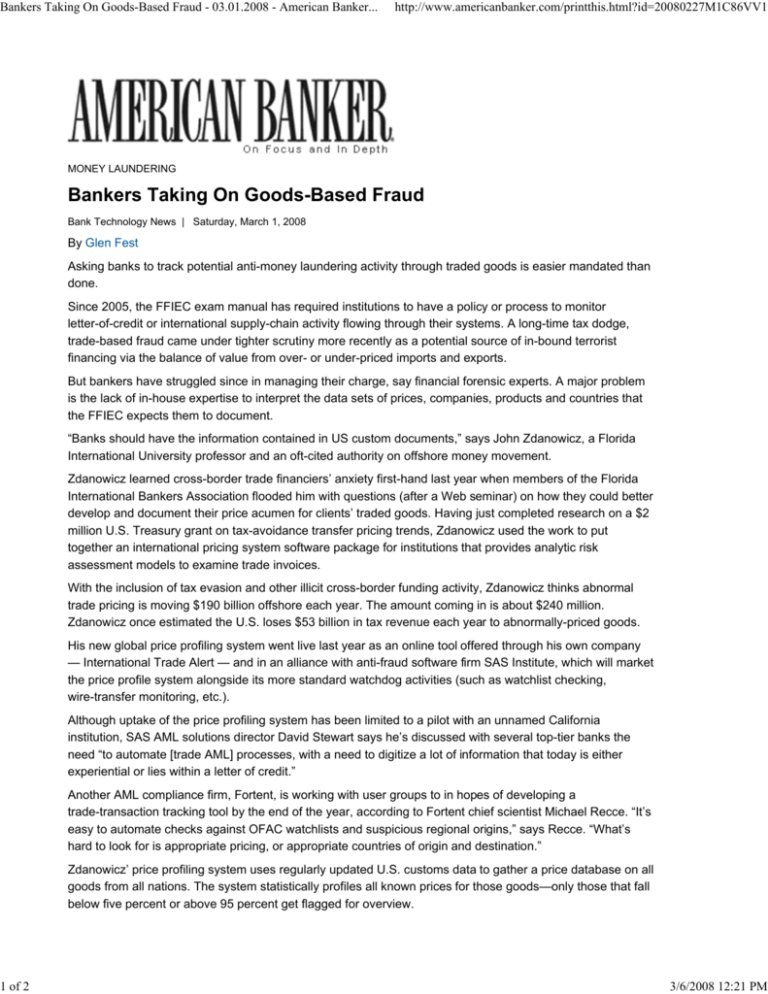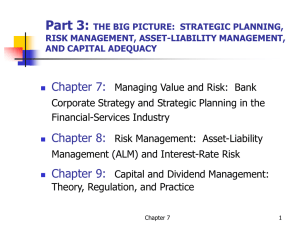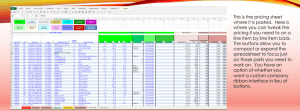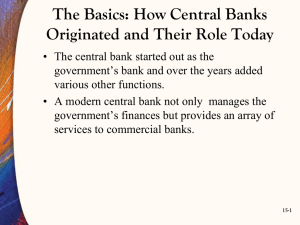
Bankers Taking On Goods-Based Fraud - 03.01.2008 - American Banker...
1 of 2
http://www.americanbanker.com/printthis.html?id=20080227M1C86VV1
MONEY LAUNDERING
Bankers Taking On Goods-Based Fraud
Bank Technology News | Saturday, March 1, 2008
By Glen Fest
Asking banks to track potential anti-money laundering activity through traded goods is easier mandated than
done.
Since 2005, the FFIEC exam manual has required institutions to have a policy or process to monitor
letter-of-credit or international supply-chain activity flowing through their systems. A long-time tax dodge,
trade-based fraud came under tighter scrutiny more recently as a potential source of in-bound terrorist
financing via the balance of value from over- or under-priced imports and exports.
But bankers have struggled since in managing their charge, say financial forensic experts. A major problem
is the lack of in-house expertise to interpret the data sets of prices, companies, products and countries that
the FFIEC expects them to document.
“Banks should have the information contained in US custom documents,” says John Zdanowicz, a Florida
International University professor and an oft-cited authority on offshore money movement.
Zdanowicz learned cross-border trade financiers’ anxiety first-hand last year when members of the Florida
International Bankers Association flooded him with questions (after a Web seminar) on how they could better
develop and document their price acumen for clients’ traded goods. Having just completed research on a $2
million U.S. Treasury grant on tax-avoidance transfer pricing trends, Zdanowicz used the work to put
together an international pricing system software package for institutions that provides analytic risk
assessment models to examine trade invoices.
With the inclusion of tax evasion and other illicit cross-border funding activity, Zdanowicz thinks abnormal
trade pricing is moving $190 billion offshore each year. The amount coming in is about $240 million.
Zdanowicz once estimated the U.S. loses $53 billion in tax revenue each year to abnormally-priced goods.
His new global price profiling system went live last year as an online tool offered through his own company
— International Trade Alert — and in an alliance with anti-fraud software firm SAS Institute, which will market
the price profile system alongside its more standard watchdog activities (such as watchlist checking,
wire-transfer monitoring, etc.).
Although uptake of the price profiling system has been limited to a pilot with an unnamed California
institution, SAS AML solutions director David Stewart says he’s discussed with several top-tier banks the
need “to automate [trade AML] processes, with a need to digitize a lot of information that today is either
experiential or lies within a letter of credit.”
Another AML compliance firm, Fortent, is working with user groups to in hopes of developing a
trade-transaction tracking tool by the end of the year, according to Fortent chief scientist Michael Recce. “It’s
easy to automate checks against OFAC watchlists and suspicious regional origins,” says Recce. “What’s
hard to look for is appropriate pricing, or appropriate countries of origin and destination.”
Zdanowicz’ price profiling system uses regularly updated U.S. customs data to gather a price database on all
goods from all nations. The system statistically profiles all known prices for those goods—only those that fall
below five percent or above 95 percent get flagged for overview.
3/6/2008 12:21 PM
Bankers Taking On Goods-Based Fraud - 03.01.2008 - American Banker...
2 of 2
http://www.americanbanker.com/printthis.html?id=20080227M1C86VV1
The models measure not only price-to-quantity, but also price-to-product. Banks can more easily determine if
an invoice for a shipment of watches is spurious if they know whether it contains Swiss masterpieces or a
pile of cheap knockoffs. Zdanowicz’ company produces product and country trade reports culled from data of
U.S. customs districts. Zdanowicz also recently co-developed for U.S. Customs an abnormal weight
detection system, which at some point might be added to the pricing profile system.
Without new technology, most banks find that tracking product and country-of-origin particulars requires
manual intervention that can’t be wrapped into existing automated AML compliance suites. Some
international trade-finance operations at global money-center banks sift through 10,000 letters-of-credit daily,
by hand. So while not “knee-deep” in technology, says Aite Group senior analyst Nancy Atkinson, “Trade
finance people are aware they need to be watching this.” (c) 2008 Bank Technology News and SourceMedia,
Inc. All Rights Reserved. http://www.banktechnews.com http://www.sourcemedia.com
© 2008 American Banker and SourceMedia, Inc. All Rights Reserved.
SourceMedia is an Investcorp company. Use, duplication, or sale of this service, or data contained herein, except as described
in the Subscription Agreement, is strictly prohibited.
For information regarding Reprint Services please visit: http://www.americanbanker.com/reprint-services-rates.html
3/6/2008 12:21 PM






